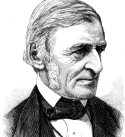Oversoul World Ministries
A COMMON BELIEF SYSTEM FOUNDED IN 1844
The belief in a "higher power" sometimes referred to as the Supreme Intelligence, has been well established from the beginning of time, throughout all the civilizations of the World. The earliest cave drawings evidence the searching heart of Mankind in the intuitive visualizations of a "higher power" --- the unseen Creator and administrator of Nature. Every successive civilization of the World has asserted beliefs in an unseen reality transcending the known which they assert may be approached through a variety of prescribed means. How can one define that which is universal, yet not uniform?
Emerson believed that Reason, the highest capacity of mind, was a sensitive receiver of universal signals of meaning, that once we allow our understanding to inform our reason, we make Nature serve our character, which is expressed by the higher aspects of human life, namely philosophy, religion, art, morals, ethics and culture. It is only when human life in its guise as civilization ignores the Laws of Nature that we fail and fall into chaos. War, repression, depressions, plagues, and revolutions all result from this ignorance or denial of Universal Law as seen through the workings and symbols of Nature.
The Over-Soul is Emerson's celebration of the mystery of the human soul in matter and its mysterious existence as "part and particle" with the eternal One. The image of the "One" or the essential unity of the Universe that is the Absolute is a concept which is both Eastern and Neoplatonic. Emerson describes this One as infusing all of the life and forming the nature of human nature. it is God ernanating through-out the universe and concentrating His nature in human consciousnesses.
Transcendentalism has been identified with the monastic mind set as it has invested itself upon monks going all the way back to the time of St. Ambrose of Milarn (347-397 A.D.) and St. Augustine of Hippo (354-430 A.D.); the New Testament writers before them, and indeed virtually all of the Old Testament writers. The whole being sometimes referred to as the Judo-Christian transcendentalist ethic, the asserted basis of all United States Law. Countless encyclopedias, bibles, dictionaries, philosophical and technological articles, books, theses, testaments and even gospels have been written on this subject.
Emerson's friend Noah Webster included the word OVERSOUL in his dictionary: Oversoul (n) "the spiritual element of the universe which is infinite and from which finite souls draw their being and support. Merrian Websters's 10th Collegiate Edition defines OVERSOUL as "the absolute reality and basis of all that exists, conceived as a spiritual being in which the ideal nature imperfectly manifests in human beings and is perfectly realized.
Many of the notables of history added their names to the long list of Americans who have embraced the concepts and teachings of Emerson. Such names as Henry David Thoreau, Walt Whitman, Helen Keller, Frank Lloyd Wright, John Muir, and Johnny Appleseed --- are just a few. Mahatma Gandhi, read Thoreau's "Civil Disobedience" and named India's non-violent struggle for independence Satyagraha (in protest against civil and religious abuses); Martin Luther King Jr. wrote about how he became fascinated with Thoreau's view of the government and used it as the basis for his civil rights movement. LIterary efforts inspired the words given to such songs as The Battle Hymn of the Republic by James Freeman Clarke and Juliet War Howe, and America the Beautiful by Samuel Grey Ward.
.
Emerson's Oversoul has become a philosophical teaching as well as an Associative Religion, tracing its roots all the way back to the writings of Job, Moses, Plato, Socrates, Kant, Hagel, Echhart and Swedenborg. While the American "common belief system" was advanced by Emerson in his essays; Over-Soul, Nature and Self-Reliance, the transcendental thoughts go back to 1517, the Reformation and Martin Luther, which affirmed the justification of faith within the inner man.
Emerson taught that the basic concept of religion, received from our forefathers, was the inalienable ability of an individual to communicate with his/her Creator, one on one, in Nature. Emerson felt that moderns seem able only to see those things through the eyes of the earlier generations. "Why, he asks --- should not we also enjoy an original relation to the Universe?" Why should not we have a poetry and philosophy of insight and not of tradition, and a religion by revelation to us, and not the history of theirs?"
Overs-Soul religiosity has essentially evolved into a moral philosophy, an idealistic system of thought based upon the belief in the essential unity of all creation, the innate goodness of man, the supremacy of insight over logic and experience for the revelation of the deepest truths. Oversoul religiosity proclaims the dignity of the individual, cuts the roots of institutional tyranny; and turns the mind to imagination, hope, exploration and self-reliance. This philosophy embodies the very essence of American values and is taught in virtually every Western University of the free World.
The Oversoul Associative Religion is then a direct extension of these original "free thinkers" who embraced the teaching and open mindedness associated with a New Consciousness and Spirituality which has been "institutionalized" into a World Religion. From the beginning of the Oversoul, men and women of all races have played a prominent role in developing this Spirituality. The Oversoul continues to encourage openness, and is so doing is an advocate and embraces diversity --- of age, race, ethnicity, gender, economic status, abilities and marital status.
Ralph Waldo Emerson (1803-1882) coined the word OVER-SOUL while a divinity student at Harvard University. The word comes from the Greek word Psyche, meaning "the Soul" and Huper or Hyper, meaning "Over." This name was readily acceptable to global students, of all faiths, as a generic, non-sectarian term meaning "over abiding presence" i.e., the Creator. The philosophical concept was developed by the Greek philosopher Plato (427-347 BC). He affirmed the existence of absolute goodness, which he characterized as some thing beyond description and as knowable ultimately only through intuition. Religious philosophers applied this concept of transcendence to Divinity, maintaining that God can be neither described nor understood in terms that are taken from human experience..
One-hundred and sixty eight years ago, a group of "free thinking" men and women from the New England area began having meetings to discuss the philosophical and socio-economic changes they envisioned for a changing cultural narrative in the United States. This informal group, led by Ralph Waldo Emerson, became known as the Transcendental Club and they created the publication known as "the Dial" to make their philosophy known to the public. This publication went on to become the main source of poetry, prose, and literary writings of the time. In the next three or four decades, most of the liturgy, philosophical, social, and religious leaders of New England were connected in one way or another with this transition from conformity. These diverse philosophies would eventually become the great American consciousness.
This group addressed all of the issues of the day, including the reform of church, state and society, the rise of free religion, the abolition movement, feminism, educational innovation and other humanitarian causes. The "free thinking" of this group gave Ralph Waldo Emerson the platform and initiative to leave the constraints of organized religion and embark upon a career as a philosopher, teacher, poet, essayist, and as many have stated, one of America's most insightful writers. Emerson's philosophy is taught in virtually every institution of higher learning in the United States, and around the World. His essays on Oversoul, Self-Reliance and Nature are the basis of every "free thinking" individual to this date.

